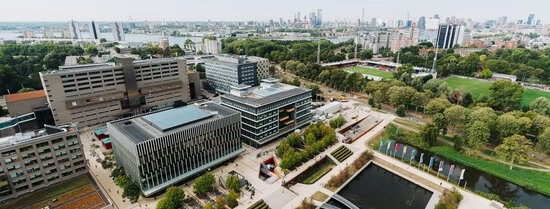Erasmus University opened the new academic year with the presentation of Strategy 2030, in which social engagement takes center stage. According to Executive Board President Annelien Bredenoord, the university should not only develop knowledge but also actively apply it to societal challenges. For the Erasmus School of Philosophy (ESPhil), this is not an abstract concept but a daily practice. The opening was extra special for ESPhil because two philosophy students played a prominent role: Ralph Ivar Berkman, alumnus of ESPhil, ESHCC and ESSB, who received the Student Societal Impact Award, and Nizar El Manouzi, student of Philosophy of a Specific Discipline, who acted as moderator.

Impact Award for alumnus
Ralph Ivar Berkman, alumnus of ESPhil, received the Student Societal Impact Award. Through his foundation L’Oiseau Bleu, he supports young people from special secondary education in their transition to vocational training (mbo), universities of applied sciences (hbo) or university. The idea for the foundation emerged during the philosophy faculty’s honours program, in collaboration with the Bildung Academie. During the ceremony, Berkman also thanked Han van Ruler, who, on behalf of ESPhil, is part of the L’Oiseau Bleu team.
According to the jury, Berkman is a role model in the field of social engagement. As Rector Magnificus Jantine Schuit stated: “He has made the impossible possible.”
Philosophy student as moderator
Also taking the stage was Nizar El Manouzi: student of Philosophy of a Specific Discipline, actor, and presenter of the Dutch TV show Klokhuis. As moderator, he led the ceremony with precision and energy. His presence gave the opening a distinctly Rotterdam, yet also philosophical, character.
Finding the way through thinking: philosophy at the heart of EUR
The Erasmus School of Philosophy gives tangible meaning to the idea of the Engaged University. Students and researchers connect reflection with practice: from collaborations with Erasmus MC and TU Delft to the new Erasmus Institute for Philosophy and Technology, where philosophers, scientists, and artists work together on the societal and ethical questions surrounding technology.
In education too, ESPhil is making great strides in line with the university’s strategic priorities. The curriculum of the interdisciplinary program Philosophy of a Specific Discipline has been renewed, better aligning it with the societal challenges students explore in their main field of study. Since this year, the faculty also offers a dual degree Arts and Philosophy together with Codarts and the Willem de Kooning Academy, where art and philosophy directly reinforce each other. The master’s program Societal Transitions is also attracting more and more students eager to engage with the philosophical and scientific questions around climate, technology, and social change.
By treating philosophy not as an isolated discipline but as a framework that runs through all fields of study, the faculty demonstrates what Strategy 2030 aims for: a university at the heart of society, addressing the major questions of our time.

